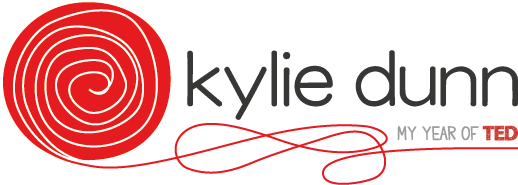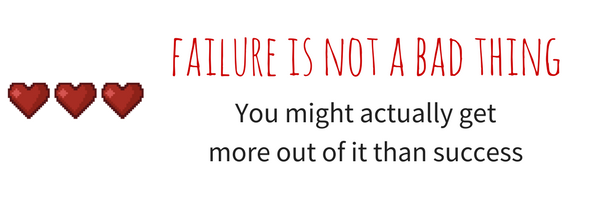Failure is an Important Part of the Process
We all need to understand that failure is simply part of the learning process; getting things wrong is a constant and important part of life. It's when we accept this that true learning can begin.
We are taught, from a young age, that getting things wrong is bad. If you fail at school, it means you aren't smart enough, or you were too lazy and didn't work hard enough. But this is so far from the truth! Many employers are starting to realise the importance of accepting failure in their workplace - Google even pushes their teams to see how quickly they can fail.
I've written a lot about wrong, having included Being Wrong as one of My Year of TED activities; and I've even written a few posts in the last six months about confidence injuries (and in Thrive Global). But as I was developing material for a recent course, I came up with yet another way of conceptualising the importance of failure in the learning process.
Our Relationships with Failure
But before we get there, I've had an interesting relationship with failure throughout my life, as I'm sure everyone has. There are some areas in my life where I would not accept even the slightest of failures - and yet other areas where I would readily acknowledge that trying and failing was the only way to learn. It's fascinating how we can hold two opposing ideas on a topic, and never acknowledge how they exist alongside each other - yeah, that's a whole other post.
In hindsight, I can see how the split worked in my brain. Trial and error were the best way to learn computer systems - which became a significant part of my career for many years. Getting in and playing with the system; trying to break it so I could understand what worked and what didn't; learning through getting it wrong. As far as I am concerned they are the best ways to learn IT systems; I still practice this today with all of the tools I use to run my business. But my job was usually working out the system so I could work out how we would use it in my workplace - then I would develop the procedures and train it.
And I had some spectacular failures in that space, which were okay because I analysed them and made sure I didn't do that again.And yet, I wouldn't allow myself the privilege of considering that learning model as relevant in any other part of my life. My failed marriages were an indictment on me as a human being capable of loving and being loved - and proved I was a poor decision maker as well. I was mortified if I got a document wrong at work; misspoke in briefing or meeting; got someone's name wrong; misunderstood the intent of a question; turned up late for anything; forgot to do a piece of work... the list could go on and on.
A Kinder and Gentler Conceptualisation
During My Year of TED, I developed the art of self-compassion and learned to re-conceptualise failure/wrongness in my life. Giving my perfectionist a huge kick was part of that process, as was improving my confidence and understanding my mistakes don't define me as a person.
Importantly, developing these skills has allowed me to pull back and consider how we learn and the value of failing in a more open way. Which stimulated all the articles (including this one), and the new visual for the learning cycle. So here is the image I've developed:
The Path of Success
When we do something and succeed, it allows us to gain skills and confidence in our abilities. Success will naturally lead us to increase the risks we're willing to take with that task - possibly resulting in the confidence injuries I've been writing about. The end result though, is that we grow in our task skills and general confidence to learn and succeed. This is great, but it's only part of the story.
The Path of Failure
When we fail and reflect on the reason/outcome of the failure (this is the vital component), we can gain greater understanding of the process itself, and how to avoid future failure. We also gain invaluable experience of the action and an understanding that failure is survivable and recoverable (for the most part). More importantly though, going through failure can allow us to increase our resilience and tolerance for failing.
The end result of failure is also growth, but a more holistic growth. As long as we reflect on the failure and can see the lessons, we develop our understanding of the world; our confidence to cope and possibly problem solve; our understanding of ourselves and the skill/task we were trying to do; and our resilience to cope with future failure and setbacks.
Which would you prefer?
Put that way, which side of the learning cycle would you prefer to follow? Sure, you can rapidly increase your skills and possibly even mastery by continually succeeding, but there is intrinsic value to your growth as a human being in failing. We simply have to get better at accepting failure as an essential part of the learning process - and an unavoidable part of life.
It feels great to succeed and get something 'right', we all know this. But if you learn to remove your judgement about failure, and celebrate the lessons it can provide, it can feel just as valuable to be 'wrong'.
I'd love to know what you think about this. It is the first time I've tried to explain this conceptualisation, but it will undoubtedly be something that continues to evolve.


